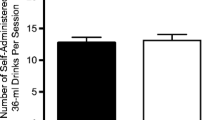Abstract
This study was designed to test the hypothesis that the relation between an individual's expected and actual impairment under alcohol develops as a function of drinking experience. Fourteen early stage, novice (N) and 14 experienced (E) male social drinkers participated in the research. Group N had been drinking for 20 months or less (mean =8.1 months). Group E subjects had been drinkers for 24 or more (mean =42.7 months). All subjects practised a task that measured psychomotor skill (pursuit rotor) and rated the degree to which alcohol was expected to impair their performance on the task. Half of the subjects in each group then performed the task under alcohol (0.56 g/kg). The remainder served as controls and received no beverage prior to performing the task. In accord with the hypothesis, experienced drinkers who expected more impairment performed more poorly under alcohol, whereas novice drinkers' expected and actual impairment were not related. In addition, when novice and experienced drinkers received no beverage, their expectations were unrelated to their drug-free performance. Thus alcohol expectancies were not relevant to performance in a non-drinking situation. These findings contribute new information identifying drinking history as an important factor strengthening the relationship between expectations about the effect of alcohol and behavior under the drug.
Similar content being viewed by others
References
Bolles RC (1972) Reinforcement, expectancy and learning. Psychol Rev 79:394–409
Bolles RC (1979) Learning theory, 2nd edn. Holt, Rinehart, and Winston, New York
Brown SA (1993) Drug effect expectancies and addictive behavior change. Exp Clin Psychopharmacol 1:55–67
Christiansen BA, Goldman MS (1983) Alcohol related expectancies vs. demographic/background variables in the prediction of adolescent drinking. J Consult Clin Psychol 51:249–257
Christiansen BA, Goldman MS, Inn A (1982) The development of alcohol-related expectancies in adolescents: separating pharmacological from social learning influences. J Consult Clin Psychol 50:336–344
Fillmore MT, Vogel-Sprott M (1995) Expectancies about alcohol-induced motor impairment predict individual differences in responses to alcohol and placebo. J Stud Alcohol 56:90–98
Fillmore MT, Mulvihill LE, Vogel-Sprott M (1994) The expected drug and its expected effect interact to determine placebo responses to alcohol and caffeine. Psychopharmacology 115:383–388
Goldman M, Brown S, Christiansen B (1987) Expectancy theory: thinking about drinking. In: Blane H, Leonard K (eds) Psychological theories of drinking and alcoholism. Guilford Press, New York, pp 181–226
Leigh BC (1989) In search of the seven dwarves: issues of measurement and meaning in alcohol expectancy research. Psychol Bull 105:361–373
Mann LM, Chassin L, Sher KJ (1987) Alcohol expectancies and the risk for alcoholism. J Consult Clin Psychol 55:411–417
Rather BC, Goldman MS (1994) Drinking-related differences in the memory organization of alcohol expectancies. Exp Clin Psychopharmacol 2:167–183
Stacy AW, Leigh BC, Weingardt KR (1994) Memory accessibility and association of alcohol use and its positive outcomes. Exp Clin Psychopharmacol 2:269–282
Vogel-Sprott M (1992) Alcohol tolerance and social drinking: learning the consequences. Guiford, New York
Author information
Authors and Affiliations
Rights and permissions
About this article
Cite this article
Fillmore, M.T., Vogel-Sprott, M. Behavioral effects of alcohol in novice and experienced drinkers: alcohol expectancies and impairment. Psychopharmacology 122, 175–181 (1995). https://doi.org/10.1007/BF02246092
Received:
Revised:
Issue Date:
DOI: https://doi.org/10.1007/BF02246092




